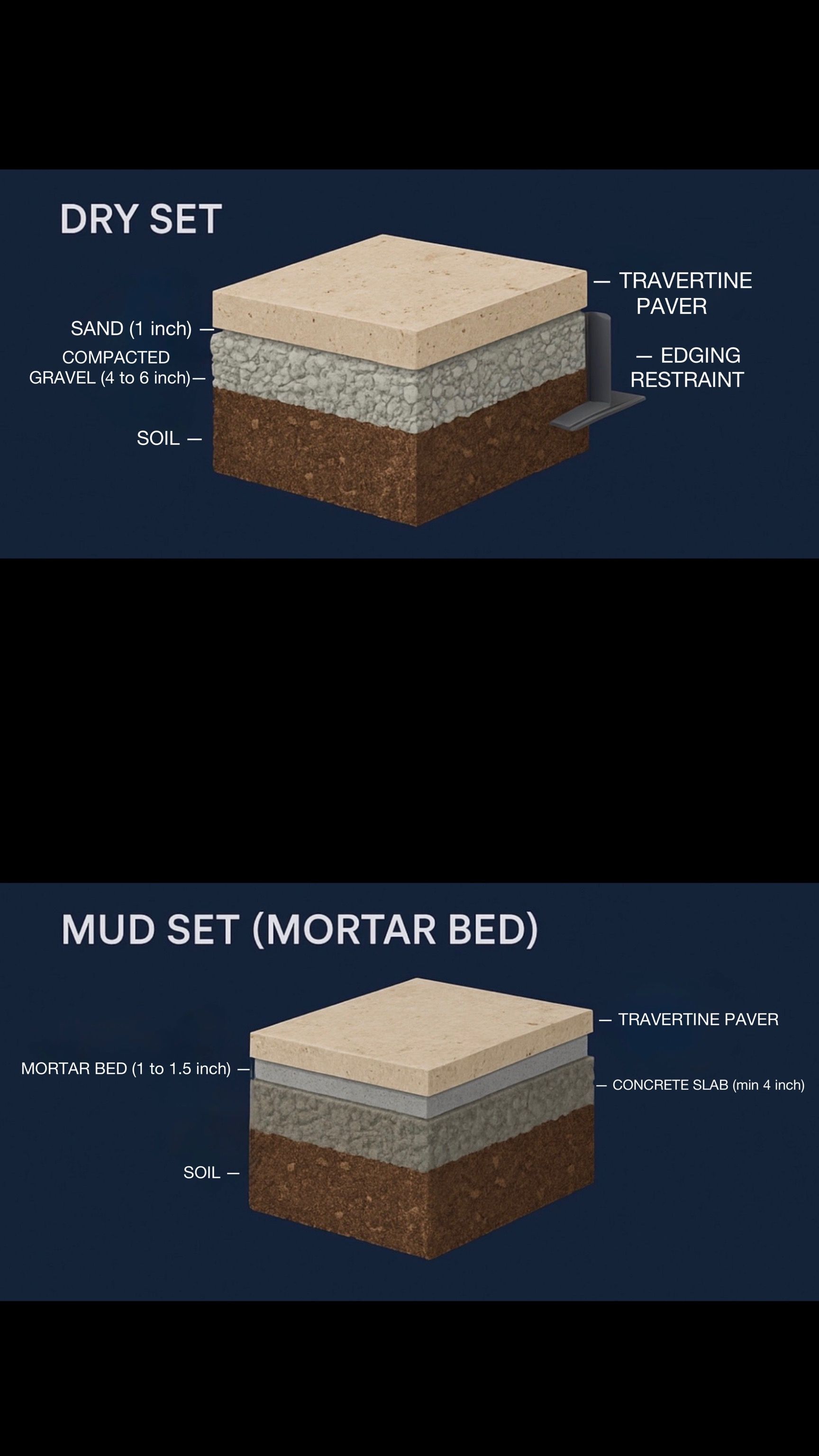Installing Travertine Pavers in New Jersey?
Start Here.
Expert installation advice and trusted suppliers for travertine pavers and marble pavers in NJ.
Know Before You Dig
Understand the fundamentals of travertine installation in New Jersey’s climate. Learn what base materials you’ll need, how to prevent shifting, and how to plan for drainage and frost heave.
Pick the Right Method
From dry-set to mud-set and overlay methods — we break down which installation technique is best for patios, pool decks, driveways, and walkways in your region.
Choose the Right Stone
Not all travertine is created equal. Learn the difference between tumbled, honed, and filled pavers — and find out which is best for your budget, climate, and application.

Before You Start
Travertine pavers are beautiful and long-lasting, but before you break ground, there are a few key things every New Jersey homeowner or builder should understand.Here’s what to consider:
Freeze–Thaw Resistance:
Use premium-grade (dense), tumbled travertine pavers to avoid cracking or flaking.
Drainage:
Poor drainage or high water tables (common in Central/South Jersey) may require French drains or deeper base prep to prevent frost heave.
Slope & Runoff:
On sloped properties, poor water management can cause erosion or shifting. Plan for proper grading.
Salt Sensitivity:
If you’re planning to use pavers for a salt-water pool or driveway or walkway that’s salted in winter, you should seal it.
Weight Load:
Use 1.25" inch (or thicker) travertine or set tiles (0.5" inch) over reinforced concrete. For driveways, use 1.25 inch thick in smaller sizes (like 6x12) or 2 inch thick in larger sizes.
Installation Methods
Here are the main installation methods used in New Jersey:1. DRY SET
(Most Common for Patios & Pool Decks)
Base: Excavate 6–8 inches. Add 4–6 inches of compacted ¾” crushed stone.
Edge Restraints: Required — use concrete curbing, plastic, or metal edge to prevent movement.
Bedding: Add 1 inch of sand.
Pavers: Lay travertine pavers (typically 1.25" thick) tightly with no joint spacing.
Joint Filling: Sweep in polymeric sand.
Best for: Patios, walkways, pool decks.
✅ Pros: Affordable, flexible, easy to repair.
⚠️ Caution: Must ensure proper drainage, no pooling or standing water below.
2. MUD SET OVER CONCRETE
(Best for Driveways or Uneven Ground)
Slab: Pour a reinforced concrete base, minimum 4 inches thick, with proper slope (1–2% away from structures).
Bonding Layer: Apply a slurry of thinset mortar to the concrete.
Mortar Bed: Spread 1–1.5 inches of wet mortar.
Pavers: Press travertine into place, tap with a rubber mallet to level.
Grout: Use polymeric sand. Sweep into the joints
Best for: Driveways, slopes or areas with heavy use.
✅ Pros: Permanent, solid surface with minimal shifting.
⚠️ Caution: Higher labor cost; less breathable, ensure expansion joints and drainage control.


Travertine Suppliers
Choosing the right travertine supplier can save you thousands — and prevent costly installation headaches. Here's how the top suppliers stack up in New Jersey:TRAVERTINE MART
Best for wholesale pricing, variety, and reliable nationwide delivery.
Travertine Mart offers premium-grade Ivory, Silver and Walnut travertine pavers at true wholesale rates to the public. Their direct-to-site delivery model ensures full pallets arrive fast and intact with no showroom markup. Known for French pattern sets, tumbled finishes and consistency, they’re ideal for large residential and contractor jobs alike.
Stone & Masonry Depot
Best for showroom service and small projects
Located in the NY/NJ metro area, offers hands-on browsing with high-end customer service. Prices are notably higher, and inventory is limited, especially for large projects. Great for accents and design inspiration, but not for budget-conscious buyers.
MSI (via local distributors)
Best for availability through regional tile retailers
MSI stone products are carried by many tile and flooring stores across NJ. Their travertine is mass-produced and widely available, making it a good option for standardized palettes. However, prices vary by reseller, and stone quality can be mixed, often bundled with non-travertine materials.
Techo-Bloc
Best for hardscape professionals (not true travertine)
While not a travertine supplier, Techo-Bloc is often considered in the same decision process. They offer concrete pavers that mimic the look of stone, with excellent durability and modular systems. Ideal for those prioritizing performance over natural variation.
Trusted Guidance. Built for New Jersey.
Every yard, every slope, every season in New Jersey presents its own challenge. That’s why this site was built, to take the guesswork out of stone installation. Whether you're a homeowner planning your first backyard upgrade or a contractor managing large residential jobs, our goal is simple: empower you with the clearest, most region-specific advice available.Testimonials
“We had no idea where to start, but this site laid it all out. Drainage, sealing, the right pattern, it helped us ask smarter questions and avoid a bad contractor.”
— Jessica P., Homeowner, Montclair NJ
“The dry-set and mud-set diagrams alone saved me from a messy redo. I now send clients here before they even get an estimate — it cuts the consultation time in half.”
— Luis R., Contractor, Edison NJ
“We were quoted $14,000 more from a local showroom before finding Travertine Mart through this site. Same material, way better delivery timeline. Total game-changer.”
— Amina & Kareem H., Homeowners, Princeton NJ
Frequently Asked Questions
You can, but you probably shouldn’t. In shaded or wet areas, unsealed travertine is more likely to darken or grow algae. Sealing helps prevent stains, mildew, and freeze–thaw damage, especially around pools or under trees.
Yes, but only using the mud set or thinset method, depending on the thickness of the stone and condition of the concrete. The slab must be level, crack-free, and sloped away from your home. Do not use a dry set method over concrete, and always use a bonding agent or slurry if applying mortar over existing surfaces.

©2025 COMMUNITY ADVICE ALLIANCE
